Whipple Procedure (pancreaticoduodenectomy) for Pancreatic Cancer treatment in Germany
Treatment prices are regulated by national law of the corresponding countries, but can also include additional hospital coefficients. In order to receive the individual cost calculation, please send us the request and medical records.
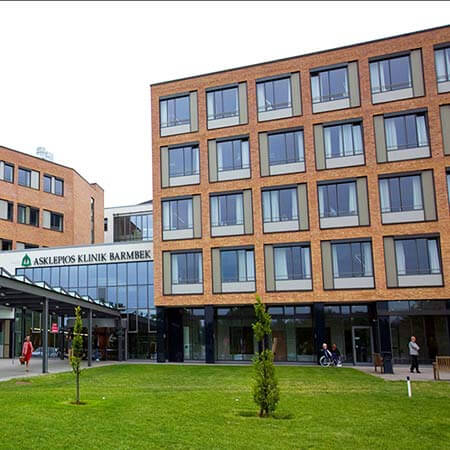
Department of General and Abdominal Surgery, Hepatopancreatobiliary Surgery and Hernia Surgery
The Department of General and Abdominal Surgery, Hepatopancreatobiliary Surgery and Hernia Surgery offers the full range of services in the areas of its specialization. The department's surgical team successfully performs interventions for diseases of the stomach, esophagus, small intestine, large intestine, rectum, pancreas, liver, gallbladder, and bile ducts. Patients with various types of hernias, including inguinal, umbilical, and incisional hernias, are also operated on here. It should be noted that the department also performs cytoreductive surgery with hyperthermic intraperitoneal chemotherapy (HIPEC), which is an advanced treatment method for peritoneal carcinomatosis. The specialists at the medical facility strive to provide patients with not only effective but also as sparing treatment as possible. That is why the use of minimally invasive surgical techniques is a priority. Such an approach to treatment practically eliminates surgical risks and reduces the duration of a hospital stay. The department has the status of an Expert Center for Liver and Pancreatic Surgery as well as a Competence Center for Upper Gastrointestinal Surgery, which is confirmed by the certification from the German Society for General and Visceral Surgery (DGAV). In addition, the medical facility regularly demonstrates high success rates in the surgical treatment of gastrointestinal cancers, which are confirmed by the certification from the German Cancer Society (DKG).
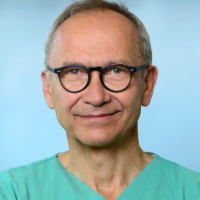
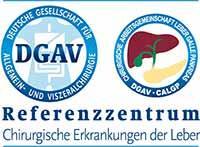



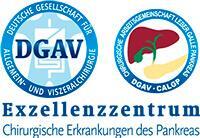

Department of General, Abdominal Surgery and Surgical Oncology
The Department of General, Abdominal Surgery and Surgical Oncology offers the full range of services in these medical fields. Whenever possible, operations are performed using minimally invasive techniques, which are the gold standard of modern surgery. The outstanding quality of medical care is confirmed by numerous prestigious certificates, including certificates from the German Cancer Society, the German Hernia Society, etc. In addition, the department provides innovative hyperthermic intraperitoneal chemotherapy (HIPEC), which is available only in the most progressive clinics in Europe.
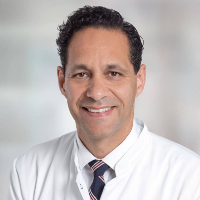




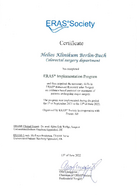
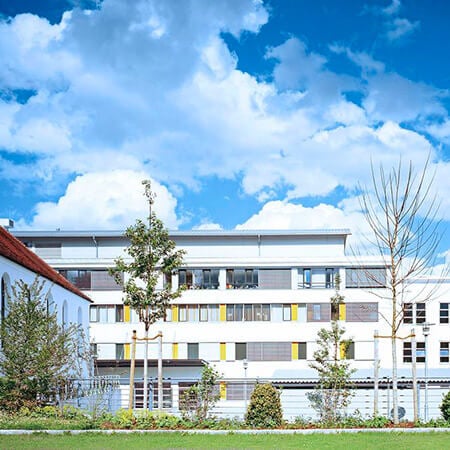
Department of General and Abdominal Surgery, Colorectal Surgery, Hepatopancreatobiliary Surgery, Hernia Surgery and Bariatric Surgery
The Department of General and Abdominal Surgery, Colorectal Surgery, Hepatopancreatobiliary Surgery, Hernia Surgery and Bariatric Surgery provides the full range of surgical treatment in its field of competence. The department's highly qualified surgeons annually perform about 2,000 surgical interventions. Extensive clinical experience allows the specialists to perform even particularly complex operations. The department’s advanced operating rooms serve for surgery to treat gastrointestinal diseases, liver, gallbladder, bile duct, pancreatic, rectal, anal and colon pathologies. The medical facility also successfully performs operations to treat hernias: inguinal, umbilical, and anterior abdominal wall hernias. In addition, the department's doctors deal with the surgical treatment of morbid obesity. Minor traumatic laparoscopic interventions are considered the gold standard, which guarantee a patient minimal risks and rapid postoperative restoration. Surgeons tell the patient in detail about their upcoming treatment and, in every possible way, support them in their recovery.
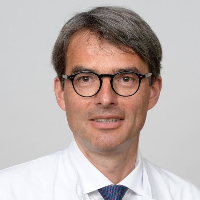





Treatment of pancreatic cancer remains a complex problem in modern oncology. One of the reasons for this is a significant proportion of tumors diagnosed at the advanced stages when one has to fight not only the primary neoplasm but also its metastases, as well as the consequences of compression of the surrounding structures caused by a significant tumor volume.
What is pancreatic cancer?
Pancreatic cancer is a malignant tumor that develops in the tissues of the pancreas that is located near the stomach. Most often it occurs in the head (50-80% of cases), less often in the body or tail of the pancreas.
Although the reasons for its development are still largely unknown, smoking and excessive alcohol consumption can contribute to the development of this tumor, as well as diet high in fat and protein, obesity, and diabetes mellitus.
However, in many cases, cancer occurs in the absence of these factors, including in people over 50. In 5-10% of cases, there is a family predisposition. Certain genetic mutations also play a role, including mutations in the BRCA2 gene, which have already been proved to be contributing to the development of breast and ovarian cancers.
Pancreatic cancer symptoms
At the early stages of the pancreatic cancer diagnosis, symptoms are usually absent. Later, there is pain in the stomach area irradiating to the back or lower back. Weight loss and indigestion are also common. With cancer of the head of the pancreas, obstruction of the bile ducts and obstructive jaundice develop.
Diagnostics of pancreatic cancer in Germany
Diagnostics includes the following examinations:
- Laboratory blood tests
- Ultrasound examination
- Computed tomography and magnetic resonance imaging (CT, MRI)
- Endoscopic retrograde cholangiopancreatography
- Angiography
Cancer diagnostics and further treatment in Germany are based on the biopsy results. For pancreatic cancer, a biopsy is done percutaneously under CT or ultrasound guidance.
Pancreatic cancer treatment in Germany
Although pancreatic cancer is considered extremely serious, it is still curable. In the case when a tumor is found in the head of the pancreas, doctors use the Whipple procedure (pancreaticoduodenectomy) – the surgery that represents the most effective type of treatment. This is one of the most difficult surgical procedures in pancreatic cancer treatment in Germany, but it gives patients a chance to get rid of the disease.
Modern surgical techniques for treating pancreatic cancer can increase the survival rate and quality of life significantly. In Germany, Whipple procedure pancreaticoduodenectomy, is performed with minimally invasive laparoscopic access and is accompanied by powerful medical support. Due to this the postoperative period is significantly reduced, and patients can return to normal life within a few days after the surgery.
During the Whipple procedure, the head of the pancreas, the gallbladder, and part of the biliary tract, the duodenum, and sometimes stomach are removed. In some cases, partial gastric resection is performed during the surgery. After removal of the organs, the remaining segments of the gastrointestinal tract are sutured and its patency is restored.
In pancreatic cancer, surgery may also be palliative. If the tumor is inoperable, Whipple procedure is not advisable. In such cases, a surgery is aimed at eliminating obstructive jaundice: during surgery, a stent is implanted into the bile duct or an alternative pathway for the outflow of bile from the liver into the intestine is formed.
Cancer treatment in Germany is usually complex. It consists of surgery and chemotherapy and/or radiotherapy. With pancreatic cancer, chemotherapy is prescribed to almost all patients. Even in cases where surgery does not lead to a cure, chemotherapy can reduce the size of the tumor. Radiation therapy has the same effect and can be used to target large pancreatic tumors prior to surgery.
Complications of Whipple procedure (pancreaticoduodenectomy)
- Diabetes mellitus
Surgery on the head of the pancreas can lead to the development of diabetes. The risk of developing diabetes is more significant in patients whose blood glucose levels were above normal before surgery. In any case, after Whipple surgery, it is recommended to follow a special diet and refrain from excessive consumption of sugar.
- Fistula formation
After the surgery, where the head of the pancreas is removed, the rest of the pancreas is connected to the intestines. Pancreatic tissue has a soft texture and a tendency to tear at the suture site. Through the formed holes, gastric juice with digestive enzymes flows out. It damages the surrounding tissue and leads to the formation of a fistula. In most cases, the fistula heals on its own.
- Gastroparesis (gastric paralysis)
In the first days after the Whipple procedure (pancreaticoduodenectomy), until the restoration of gastrointestinal peristalsis has occurred, the patient is prohibited from taking any food or drinking fluids. He receives all the necessary nutrients in the form of intravenous infusions. Approximately 25% of patients experience gastroparesis after Whipple procedures, the average duration of gastroparesis is 4-6 weeks. Then the adaptation of the gastrointestinal tract takes place, and the peristalsis of the stomach is restored.
- Disorders of intestinal absorption and digestion
The pancreas secretes enzymes that play an important role in the digestion process. The long-term effects of pancreatic surgery can manifest as digestive disorders. Patients may have diarrhea, undigested food in the feces, abdominal pain, and weight loss. In such cases, it is necessary to follow the diet recommended by the nutritionist and take medications containing pancreatic enzymes.
Postoperative period
In pancreatic cancer treatment, proper care and diet in the postoperative period are very important. On the first day after the surgery, fasting is recommended, only mineral still water and herbal tea without sugar are allowed.
On the second and third days, it’s allowed to eat soup. Thicker food is given to the patient only on the fifth day and according to the doctor's recommendations.
The patient's recovery depends not only on the skill of the surgeon but also on the own desire of the patient and the attitude towards the recovery.
Prognosis
A positive outcome depends on the time the disease was detected. The earlier the disease is diagnosed, the more successful and effective the surgery will be. The Whipple procedure does not give a complete guarantee of recovery, because this disease is prone to recurrence, and the type of tumor directly affects the life prognosis of patients.
Surgical treatment of pancreatic cancer is possible if the tumor is located within the organ, there are no metastases, and vital arteries and veins are not affected.
The goal of Whipple procedure for pancreatic cancer is a partial or total removal of the organ. It depends on the size of the neoplasm, as well as on its location. Surgical intervention is performed by a multidisciplinary team consisting of a surgeon, oncologist, anesthesiologist, and, if necessary, a radiation therapy specialist. Due to this, all aspects of the surgery are under complete control.
After the Whipple procedure (pancreaticoduodenectomy) in Germany, a patient can expect a hospital stay of 10 to 14 days to recover and prevent postoperative risks and complications, which sometimes include infection and bleeding. Since pancreatic tissue is removed during pancreatoduodenectomy, reduced enzyme production can cause digestive problems, so long-term enzyme supplementation may be necessary after Whipple procedure.
Besides, in some cases, the patient also needs chemotherapy or radiotherapy, before or after the surgery. Additional treatment is prescribed whether before Whipple procedure in order to shrink the tumor or after Whipple procedure to reduce the risk of recurrence of the disease. The combination of therapies for pancreatic cancer increases the five-year survival rate from 25% (with exclusively surgical treatment) to more than 60% at stage I and 50% at stage II (with combined treatment).
The statistics in this area has shown that the Whipple procedure performed in a certified medical center, which employs experienced doctors who often perform the Whipple procedures, triples a patient's chances of survival. This refers to both survivors in the first days after surgery and the overall likelihood of recovery.
Due to this fact, thousands of foreign patients with malignant neoplasms of the pancreas come to Germany every year and they all undergo professional surgery.
The cost of the Whipple procedure (pancreaticoduodenectomy)
Even though the surgery is very complicated and complex, the cost in hospitals listed on the Booking Health website is relatively low. As a rule, you can save up to 30-40% of the price here.
The hospitals that are represented by Booking Health are trying to make high-tech and complex types of surgery available to the largest possible number of foreign patients with pancreatic cancer at a lower price. Therefore, they are pursuing a cost policy focused primarily on the interests of the patients.
With Booking Health, you can book the Whipple procedure for pancreatic cancer treatment in Germany at an affordable price. The cost of the procedure varies in different countries, but we can arrange a trip to Germany at a fair price.
The cost of Whipple procedure for treatment in Germany varies between 32,181 EUR and 52,560 EUR.
Where can I undergo the Whipple procedure (pancreaticoduodenectomy) in Germany?
Among hospitals, the best success rates in Whipple procedure for pancreatic cancer treatment in Germany are shown by:
- Academic Hospital Asklepios Barbek Hamburg
- Academic Hospital Brothers of Charity Munich
- University Hospital of Ludwig Maximilian University of Munich
- Charite University Hospital Berlin
- University Hospital Ulm
How can I undergo the Whipple procedure (pancreaticoduodenectomy) in Germany?
When the decision to treat pancreatic cancer in Germany has already been made, a huge number of questions arise.
Answering those questions requires specific knowledge and experience in medical tourism. It is safer, easier, and less stressful to shift some responsibility onto a medical tourism agency that can support you throughout your journey.
Booking Health is the largest and the most transparent medical tourism agency in the world. Treatment abroad is arranged by direct cooperation with leading foreign hospitals.
To undergo the Whipple procedure for pancreatic cancer treatment, please leave a request on our website. We will contact you and provide you with all the information necessary.
You can be sure that by deciding to undergo the treatment of pancreatic cancer with the Whipple procedure in Germany, you will be undergoing treatment in the best hospitals in the country, doctors of which save the lives of many patients with pancreatic cancer.

